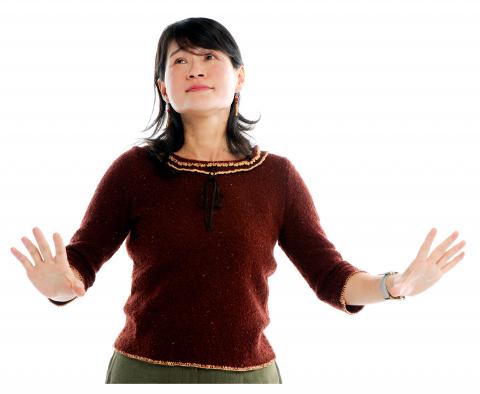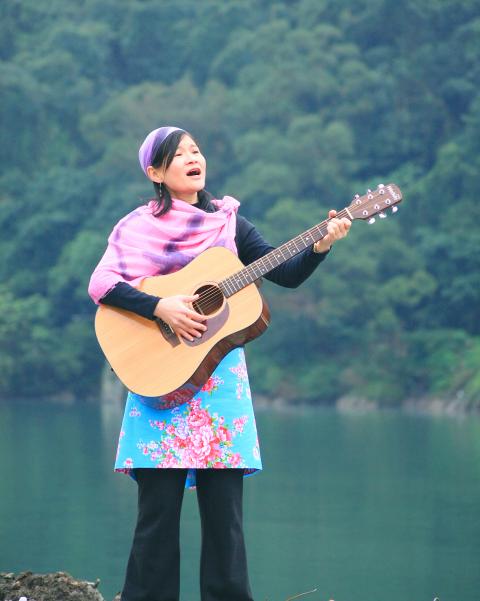My interview with Lo Sirong (羅思容) began on her rooftop in Chingtan (青潭), Sindian (新店) with a conversation about plants, flowers and small creatures. She offered me cinnamon leaves to nibble on and spoke of a lizard that strutted through the garden as if it was the ruler of a kingdom. All the while, Lo exuded the innocence of a child and the sensitivity of a poet.
In a sense, the musician embodies her music.
Born and raised in a Hakka family in Miaoli, Lo writes songs mostly, though not exclusively, in her mother tongue. Her two Hakka-language albums — Everyday (每日) her 2007 debut and The Flowers Beckon (攬花去) in 2011 — both garnered awards in Taiwan and China, winning praise from music critics on both sides of the Taiwan Strait. Some used words like “classic” and “graceful” to describe the musician’s compositions on life as a mother, lover and woman.

Photo Courtesy of Lo Sirong
For Lo, making music is a way to reflect upon and understand where she comes from.
“When I create a piece, I want to touch upon the profound, not the superficial, to convey the emotion and the unique texture, quality and depth of Hakka culture,” she said.
HAKKA ROOTS

Photo Courtesy of Lo Sirong
Lo’s entry into the world of music just over a decade ago is an oft-told story of how, when reading through the works of her father Lo Lang (羅浪) — a renowned Hakka poet — she was suddenly overcome with the desire to sing. It was a turning point in her life that reconnected the artist to her “mother culture.” Lo began collecting traditional Hakka songs and, as memories and stories from her childhood began to emerge, she began composing songs in her native tongue.
“Before I was not aware of what it meant to be a Hakka. As soon as I started writing in my native language, my relationship to my culture became clearer. Childhood memories started coming back to me … It was a powerful force pushing me forward,” the 52-year-old singer said. “My body is more relaxed when I speak and sing in my mother tongue. It is the most natural articulation of myself.”
Lo’s musical expression is an accumulation of, and continuity with, years of self-discovery and exploration. Having adhered to “mainstream values” for the greater part of her life, the musician broke away from social conventions when she fell in love with and married a man “with no money, but having a hundred works of poetry in his pocket.” Shortly after their daughter was born, the family moved to a run-down house in Wantan (灣潭), a secluded village in Sindian accessible by ferry. There, they reared chickens and ducks, grew fruits and vegetables, and lived a pastoral life that gave Lo ample time to paint, write and be close to nature and her inner voice.
When Lo writes a song, she starts with the lyrics because the musicality is inherent in the language, which is “the carrier of ideas, emotions and physical expressions unique to my culture.” When talking about her experience with her native tongue, the musician also has her own unique viewpoint.
“The Hakka dialect I speak contains many nasal sounds that resonate upward through the skull. It has a spiritual sound. Hakka people are grounded to the earth because our work was [historically] tied to the land. Consequently, I feel two opposite forces inside my body: one moves upward and the other downward, much in the same way that a plant spreads its roots deeply into the ground and blossoms against the blue sky,” Lo mused.
LADY SINGS THE BLUES
Lo works and sings with Gomoteu (孤毛頭), a blues band consisting of David Chen, Conor Prunty and Huang Yu-tsan (黃宇燦). Together, the musicians use instruments such as harmonica, mandolin, banjo and resonator guitar to create a distinct sound that’s been dubbed “Hakka blues.”
For Lo, blending blues music with Hakka vocals is not born out of a desire to experiment, but comes instead from a shared expression of emotions and felt affinity.
“The earliest blues musicians didn’t sing to an audience. At the moment of singing, the music was the only way they could lament their fate and express their loss, suffering and love,” she said. “It is a similar situation with Hakka people. During the long migration from central China to places throughout the world, Hakka people were always deemed outsiders. It was only when they sang while working in the mountains that they were able to reveal their emotions and feelings.”
Apart from blues, Lo’s music also adopts different music traditions ranging from Aboriginal music to nanguan (南管) music. However, Lo says it’s not her intention to play with genres and forms.
“I love the elegance of nanguan and the freedom of jazz. I also admire how Aboriginal music brings the image of mountains and oceans to a listener’s mind. But they are not the styles I aim for. I care more about the spiritual texture of each musical tradition and try to live it and integrate it into my personality,” the musician explained.
TRADITIONS REVISITED
Lo says her cultural traditions inspire her work. For example, the lyrics of Rock Rock Rock the Boat (搖搖搖), the opening track on The Flowers Beckon, comes from a traditional Hakka tune that uses the image of a boat on a river to portray the love and desire flowing between two people. In the songs final movement, she depicts a game of Chinese chess played in bed under mosquito netting as a metaphor for an orgasm.
“It is often said that Hakka people are emotionally conservative. But the lyrics reveal that people in the past were more open and direct than is commonly assumed,” Lo said. She added: “I hope through my work, I can rediscover traditional texts and connect them with contemporary audiences.”
At the same time, the artist looks at traditions with a critical eye to challenge and revitalize conventional ideas and values, notably using the style of Hakka mountain songs (山歌) that were traditionally deemed “too vulgar to be sung at home.”
Misfit (孤毛頭), a song from Everyday, is one such example. Lo says the song subverts traditional Hakka family attitudes that demand respect for authority by celebrating the independent thinking and free expression of youth. On the same album, I Don’t Want to Do Anything (麼介事都毋愛做 ) praises the carefree lifestyle that is anathema to the Hakka stereotype of diligence and hard work.
Inspired by childhood memories, The Rake (浪蕩子) finds its prototype in a vagabond whom Lo remembers wandering through the town where she lived as a little girl.
“I remember thinking, ‘Wow, so people can live without a family.’ Later in life, I have come to believe that a rake is someone who lives a life free from social norms and expectations — something that, deep down inside, we all desire,” Lo said.
FEMALE CONSCIOUSNESS
Lo sings about female longing and desire through the eyes of a mother, wife and woman. Whether critiquing our patriarchal society in Flying Out of the Cage (飛出籠去), or extolling female liberation in Almost 50, and I’ve Only Just Begun (捱不過四五十歲定定), the singer has a distinct voice filled with strength, warmth and understanding.
Lo said her work at a hamlet in Hsinchu a few years ago left a lasting impression on her understanding of Hakka women and their place in society. There, she worked with a group of older female villagers who had spent their lives fulfilling the stereotypical role of a woman who cares for the family and works in the fields.
“On the first day of class, I asked everybody’s maiden name to draw their attention to the fact that their identity had been wrapped up in their roles as wife, mother and aunt. It was a simple gesture, but it articulates the possibility that women can be independent individuals,” Lo said. “Women’s roles aren’t fixed. I long for a time when women can be fluid, evolving and responsible for making decisions on their own terms, rather than having it decided for them by social custom.”
In Taipei, surrounded by her flowering plants, Lo seems like a child of nature. When asked why she often falls into a trance-like state while performing, she recalls a childhood memory of singing in a church and feeling part of something much larger than herself.
It was a profound experience for the musician, to whom nature has become more than a source of inspiration.
“More and more, I long to be united with nature, to become a tiny particle in the universe that sings when it feels like singing and sleeps when it feels like sleeping,” Lo said. “When you feel your place is among all things on earth, the notion of self gradually disappears and you become part of the whole.”

April 28 to May 4 During the Japanese colonial era, a city’s “first” high school typically served Japanese students, while Taiwanese attended the “second” high school. Only in Taichung was this reversed. That’s because when Taichung First High School opened its doors on May 1, 1915 to serve Taiwanese students who were previously barred from secondary education, it was the only high school in town. Former principal Hideo Azukisawa threatened to quit when the government in 1922 attempted to transfer the “first” designation to a new local high school for Japanese students, leading to this unusual situation. Prior to the Taichung First

The Ministry of Education last month proposed a nationwide ban on mobile devices in schools, aiming to curb concerns over student phone addiction. Under the revised regulation, which will take effect in August, teachers and schools will be required to collect mobile devices — including phones, laptops and wearables devices — for safekeeping during school hours, unless they are being used for educational purposes. For Chang Fong-ching (張鳳琴), the ban will have a positive impact. “It’s a good move,” says the professor in the department of

On April 17, Chinese Nationalist Party (KMT) Chairman Eric Chu (朱立倫) launched a bold campaign to revive and revitalize the KMT base by calling for an impromptu rally at the Taipei prosecutor’s offices to protest recent arrests of KMT recall campaigners over allegations of forgery and fraud involving signatures of dead voters. The protest had no time to apply for permits and was illegal, but that played into the sense of opposition grievance at alleged weaponization of the judiciary by the Democratic Progressive Party (DPP) to “annihilate” the opposition parties. Blamed for faltering recall campaigns and faced with a KMT chair

Article 2 of the Additional Articles of the Constitution of the Republic of China (中華民國憲法增修條文) stipulates that upon a vote of no confidence in the premier, the president can dissolve the legislature within 10 days. If the legislature is dissolved, a new legislative election must be held within 60 days, and the legislators’ terms will then be reckoned from that election. Two weeks ago Taipei Mayor Chiang Wan-an (蔣萬安) of the Chinese Nationalist Party (KMT) proposed that the legislature hold a vote of no confidence in the premier and dare the president to dissolve the legislature. The legislature is currently controlled